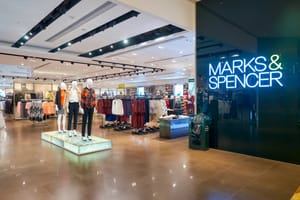To get a better understanding of Marks and Spencer, the renowned British retailer's current and future market, we are using PESTLE analysis.
Marks and Spencer (M&S) is a renowned British retailer that deals with food, clothing, and various home products. Founded in 1884, the more than a hundred-year-old chain has long been a household name in the United Kingdom (and elsewhere!). While it may seem this well-established retail giant will never stop thriving, it recently announced plans to close more than 100 stores, raising questions about its future.
In this article, we'll use PESTLE analysis — which analyzes a business' macro environment in terms of Political, Economic, Sociocultural, Technological, Legal, and Environmental factors — to get a better understanding of Marks and Spencer's current and future market. With this, we'll learn more about the outlook of this multi-billion pound company.
Marks and Spencer Political Factors
Here are two Political factors affecting M&S:
Free trade
One of the most positive aspects of modern-day politics is the free trade that has been established between a multitude of countries. Marks and Spencer, which chiefly operates in the United Kingdom, but also has locations abroad, benefits greatly from this. Free trade allows Marks and Spencer to import foreign products for sale in their stores at cheaper prices than otherwise, while maintaining a healthy profit margin. While free trade has been around for quite some time, especially for European brands, the United Kingdom's decision to leave the European Union might affect this.
Brexit
Dubbed "Brexit", the United Kingdom's decision to leave the European Union is a Political factor that might hugely impact Marks and Spencer's operations. It's unclear where the United Kingdom will stand following Brexit, especially in terms of trade regulations and tariffs, but many of the possible outcomes are less than ideal for UK retailers. For example, if the United Kingdom were to leave the European Union in a so-called "hard Brexit", this might result in the loss of numerous free trade policies with European suppliers, resulting in a higher product cost for end consumers.
Marks and Spencer Economic Factors
Here is an Economic factor affecting M&S:
Discount competitors of Marks and Spencer
Price has always been a big factor in the retail industry, but the last few decades have seen numerous budget retailers pop up in the United Kingdom. From budget clothing stores to budget supermarkets, these new competitors are stealing away market share from more premium brands (like Marks and Spencer), by encouraging customers to enjoy similar products at much lower prices. In fact, Marks and Spencer's 1999 decision to switch to using foreign suppliers was probably fuelled by these discount competitors.
Marks and Spencer Social Factors
Here is a Sociocultural factor affecting M&S:
Non-trendy
Marks and Spencer is no new name in the United Kingdom. Having been around since the 1800s, the retail chain is now a household name among the youth, the elderly, and everyone in between. However, this long-standing reputation has had an unfortunate consequence: consumers are beginning to associate Marks and Spencer with the past. As new and trendy retail chains pop up every year, Marks and Spencer's reputation may become a less trendy brand for consumers — especially younger consumers.
Marks and Spencer in the ready meals sector
Within the last ten years, society has seen a wide-scale increase in the consumption of ready meals. This may be because ready meals are more palatable than ever thanks to advances in food technology. In any case, this huge new industry is a massive opportunity for any food store. Marks and Spencer has long sought to dominate this industry; while it's unclear just how large a market share the name captures, it's reportedly one of the UK's top ten ready meal distributors.
Marks and Spencer Technological Factors
Here are two Technological factors affecting M&S:
Self-checkout
One of the biggest trends in modern-day retail, especially in food stores, is self-checkout. This industry-wide trend is designed to help retailers save money that might otherwise be spent on cashiers, while simultaneously offering customers a checkout experience that is usually faster. Like most other UK food stores, Marks and Spencer has already implemented a number of self-service checkout systems across its stores.
Online shopping
Another big trend in retail is that of online shopping. As you'd expect, Marks and Spencer has already established a strong eCommerce presence, offering almost all of their goods from clothing to foodstuffs to home products. M&S takes the traditional approach to online shopping with their clothing items, delivering goods directly to buyers. However, it appears that Marks and Spencer does not deliver food items, unlike some other major food stores in the UK.
Marks and Spencer Legal Factors
We couldn't find any Legal factors affecting M&S.
Marks and Spencer Environmental Factors
Here are two Environmental factors affecting M&S:
Sustainable produce
Wanting to maintain their image as a luxury brand, Marks and Spencer has pledged to become a more sustainable retailer on numerous occasions. This relates to a multitude of Environmental factors that are present in the acquisition of food, clothing, and home products (such as carbon emissions from manufacturing processes and deforestation for farming land). Marks and Spencer's move to become a more sustainable retailer is nothing too unique, however, as many other UK retailers have pledged to do the same.
Fair trade
Fair trade, which is an initiative created to better compensate foreign producers, also has an impact on the environment. This is because smaller producers, who receive the most benefits from fair trade, generally follow more sustainable business practices than larger competitors. As a result, Marks and Spencer's decision to sell fair trade products also has an Environmental benefit.
Final Thoughts for Marks and Spencer
With over a hundred years on the UK market, and now operating across all corners of the globe, Marks and Spencer is no small fish in the world of retail. While the company has faced serious financial issues over recent years, that can certainly change.
In the current macro environment, issues for Marks and Spencer include Brexit, numerous discount competitors, and a name that's increasingly associated with a sense of antiquity. On the flipside, Marks and Spencer certainly has some upside in the current business arena, what with extensive free trade policies, a trend towards ready meals, numerous technological trends, and a push for eco-friendly products and brands.


